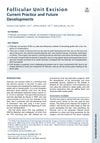 July 1996 in “Annals of Internal Medicine”
July 1996 in “Annals of Internal Medicine” Taking high doses of fluconazole for a long time can cause reversible hair loss.
[object Object]  September 2013 in “Science”
September 2013 in “Science” Human stem cells can aid stroke recovery, research experiences boost students' career aspirations, minoxidil may reduce cancer spread, a molecule can slow tumor growth, a protein affects water flow in cells, magnesium behaves differently at tiny scales, and a new method detects slow-moving objects.
 September 2013 in “Science”
September 2013 in “Science” Special astroglia cells improved stroke recovery in rats, a hair growth drug reduced cancer spread, and tiny magnesium structures were more easily shaped.
 40 citations,
May 2010 in “Australasian Journal of Dermatology”
40 citations,
May 2010 in “Australasian Journal of Dermatology” Chronic hair shedding may be caused by less variation in hair growth times and might stop on its own after several years.
17 citations,
January 2020 in “The World Journal of Men's Health” Long-term use of finasteride and dutasteride can cause serious health issues like diabetes and liver problems.
 15 citations,
January 2018 in “Acta dermato-venereologica”
15 citations,
January 2018 in “Acta dermato-venereologica” Finasteride and dutasteride increase sexual dysfunction risk by 1.57 times in male hair loss treatment.
 8 citations,
January 2008 in “European Journal of Pediatrics”
8 citations,
January 2008 in “European Journal of Pediatrics” Children with autoimmune gastritis showed improved intestinal health over time and should be checked for other autoimmune conditions.
 5 citations,
May 2022 in “Fashion and Textiles”
5 citations,
May 2022 in “Fashion and Textiles” Hair conditioners with argan oil or camellia oil improve the strength and color of bleached hair.
 3 citations,
June 2005 in “Ophthalmology Clinics of North America”
3 citations,
June 2005 in “Ophthalmology Clinics of North America” Follicular unit transplantation treats hair loss and restores eyebrows with short recovery and natural results.
 April 2024 in “Military Medical Research/Military medical research”
April 2024 in “Military Medical Research/Military medical research” Cellular and immunotherapies show promise for healing chronic wounds but need more research.
[object Object]  May 2014 in “Journal of Investigative Dermatology”
May 2014 in “Journal of Investigative Dermatology” Scientists developed tools to observe hair regeneration in real time and assess skin health, using glowing mice and light-controlled genes.
 September 2013 in “Science”
September 2013 in “Science” Certain astrocytes can protect the brain and improve recovery after a stroke, and a hair loss drug might reduce cancer spread.
 September 2013 in “Science”
September 2013 in “Science” The document concludes that human astrocytes aid stroke recovery, research confidence affects student career aspirations, collagen affects cancer spread, a microRNA suppresses brain cancer growth, calmodulin regulates water channels, and small magnesium pieces deform differently.
 140 citations,
April 2004 in “The journal of investigative dermatology/Journal of investigative dermatology”
140 citations,
April 2004 in “The journal of investigative dermatology/Journal of investigative dermatology” The enzyme 25 Hydroxyvitamin D 1 α-Hydroxylase is essential for healthy skin and recovery after skin damage.
 16 citations,
March 2018 in “Plastic and Reconstructive Surgery – Global Open”
16 citations,
March 2018 in “Plastic and Reconstructive Surgery – Global Open” Early surgical treatment for severe facial injuries from high-energy impacts leads to better recovery.
 6 citations,
December 2023 in “Lancet. Infectious diseases/The Lancet. Infectious diseases”
6 citations,
December 2023 in “Lancet. Infectious diseases/The Lancet. Infectious diseases” SIM01 significantly reduced post-COVID symptoms and is safe.
 1 citations,
January 2023 in “Research Square (Research Square)”
1 citations,
January 2023 in “Research Square (Research Square)” A neem-based herbal treatment worked better than ivermectin for sarcoptic mange in camels, improving their recovery and overall health.
 August 2023 in “MOJ women's health”
August 2023 in “MOJ women's health” Brown Adipose Tissue (BAT) could potentially treat Polycystic Ovary Syndrome (PCOS) by controlling energy balance and lipid homeostasis, but more human research is needed.
 June 1995 in “International Journal of Gynecology & Obstetrics”
June 1995 in “International Journal of Gynecology & Obstetrics” Hysteroscopic surgery is better than hysterectomy for treating dysfunctional uterine bleeding due to fewer complications and quicker recovery, with high satisfaction in both treatments.
 391 citations,
January 2010 in “Journal of The American Academy of Dermatology”
391 citations,
January 2010 in “Journal of The American Academy of Dermatology” Half of people with Alopecia Areata may see hair regrowth within a year without treatment, but recovery is unpredictable.
 232 citations,
June 1975 in “Journal of Steroid Biochemistry”
232 citations,
June 1975 in “Journal of Steroid Biochemistry” Cyproterone acetate is effective for acne but less so for hirsutism and alopecia, with some side effects and quick menstrual cycle recovery after treatment.
 58 citations,
November 2020 in “International Journal of Dermatology”
58 citations,
November 2020 in “International Journal of Dermatology” COVID-19 may cause a temporary hair loss condition called telogen effluvium in some patients after recovery.
 56 citations,
February 2010 in “PLOS ONE”
56 citations,
February 2010 in “PLOS ONE” Blocking Wnt signaling in young mice causes thymus shrinkage and cell loss, but recovery is possible when the block is removed.
 54 citations,
September 2012 in “Dermatologic Clinics”
54 citations,
September 2012 in “Dermatologic Clinics” Some medications can cause hair loss, but stopping the drug usually leads to recovery within 3 months.
 51 citations,
November 2020 in “Journal of the European Academy of Dermatology and Venereology”
51 citations,
November 2020 in “Journal of the European Academy of Dermatology and Venereology” COVID-19 infection may cause significant hair loss, but full hair recovery is likely without special treatment.
 31 citations,
June 2020 in “Dermatologic Therapy”
31 citations,
June 2020 in “Dermatologic Therapy” Patients with chronic skin conditions on systemic treatments did not have worse COVID-19 outcomes and could resume their treatments after recovery.
 17 citations,
January 2021 in “Dermatology and Therapy”
17 citations,
January 2021 in “Dermatology and Therapy” Laser-assisted drug delivery has shown improved treatment outcomes for skin conditions and has potential to reduce side effects and treatment time.
 12 citations,
April 2020 in “Facial Plastic Surgery Clinics of North America”
12 citations,
April 2020 in “Facial Plastic Surgery Clinics of North America” Follicular Unit Excision (FUE) is a popular, safe hair transplant method that avoids scars and has a quick recovery, but requires precise surgical skill.
 9 citations,
September 2012 in “Clinical Endocrinology”
9 citations,
September 2012 in “Clinical Endocrinology” More than half of patients who had acromegaly surgery experienced hair loss, with varying degrees of recovery.

Kalya Research is an AI tool that effectively finds and analyzes alternative medicine literature, saving researchers time.





























